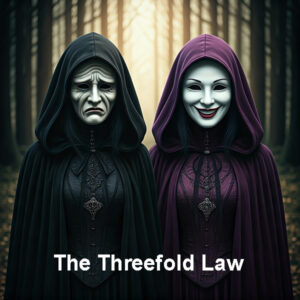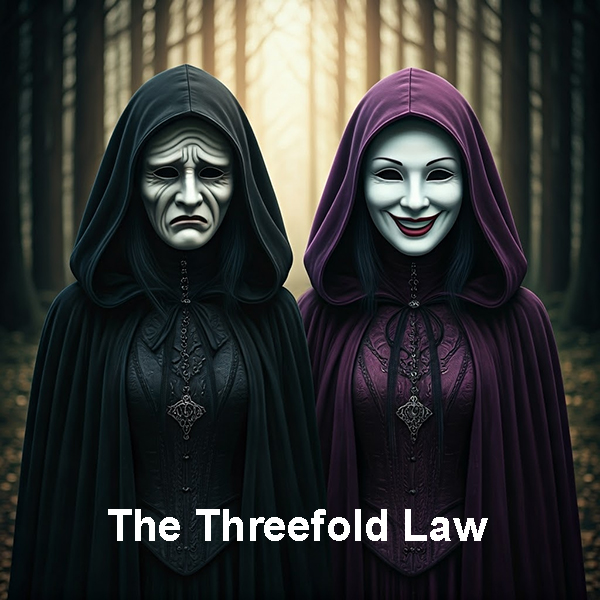 Let’s dive into a tricky discussion about the Threefold Law. This belief says that whatever you put out there—whether good or bad—will return to you three times. It’s an interesting idea, but I have my own perspective. I don’t intend to offend anyone, but I do enjoy talking about it. Let’s break this down.
Let’s dive into a tricky discussion about the Threefold Law. This belief says that whatever you put out there—whether good or bad—will return to you three times. It’s an interesting idea, but I have my own perspective. I don’t intend to offend anyone, but I do enjoy talking about it. Let’s break this down.
First, I don’t follow the Threefold Law. My beliefs differ. I’ll explain why shortly. I have this conversation a lot in our metaphysical shop, especially in tarot readings. Connect with us for more on Instagram, Facebook (Meta) or TikTok.
The Origins of the Threefold Law
The Threefold Law, sometimes called the Law of Return, has roots in both Christianity and Wicca. To be clear, though: I’m not Wiccan. I’m just a regular witch. Wicca and witchcraft aren’t the same, by the way. I follow the Hermetic Principles, not any religious laws. That doesn’t mean I’m without morals or spirituality. I also have to think too, the world is a wild and dangerous place. Sometimes, s__t just happens. The threefold law has everything to do with the hermetic principle of cause and effect.
Christianity’s Influence on the Threefold Law
Christianity has its own version of the Threefold Law. It divides the law into three parts: moral, ceremonial, and judicial. You can find this starting in Deuteronomy 6:1: “Now this is the commandment, the statutes, and the judgments which the Lord your God has commanded me to teach you.”
Here’s a quick breakdown of the three parts:
- Moral law: The Ten Commandments, which are permanently binding.
- Ceremonial law: Laws about purity, sacrifice, and worship.
- Civil law: Laws governing Israel, including judicial rules.
Ceremonial and civil laws applied only to the Old Testament. However, moral law is considered forever binding. There are also other passages that suggest what you give will return to you. For instance, Luke 6:38 says, “Give, and it will be given to you. A good measure, pressed down, shaken together, and running over, will be poured into your lap.” In simpler terms, it means that the more you give, the more you’ll receive. I don’t find that necessarily true, but sometimes it is.
The Law of Return, which reminds us that you reap what you sow, also appears in Galatians 5. However, Christianity’s evolution is not as straightforward as it seems. Over time, cultures have absorbed and altered philosophies, and as religions spread, ideas changed.
Wicca and the Threefold Law
Let’s talk about Wicca. Like Christianity, Wicca shares this idea of return—what you put out will come back. In fact, the Corpus Hermeticum, not Mead’s version but the original, lays out moral philosophies that echo “do unto others as you would have them do unto you.”
This idea isn’t exclusive to Christianity, Islam, or Judaism. It’s part of a universal moral guideline that speaks of compassion. So far, so good, right?
Wiccan Rede: “Harm None and Do As You Will”
Now, let’s address the Wiccan Rede: “Harm none and do as you will.” Some people call this “the ancient Wiccan Rede,” but let’s be honest—Wicca is modern, not ancient. It seems to go hand-in-hand with the threefold law. This phrase has roots in history and philosophy. It’s about personal freedom and responsibility.
Here’s what it really means:
- It encourages freedom of action but stresses the need to consider the consequences.
- It suggests that you should be free to act as long as your actions don’t harm others.
- It’s also inspired by Renaissance humanist François Rabelais.
- The phrase “Harm none” closely mirrors the Latin saying primum non nocere, or “first, do no harm.”
I think the Rede is meant to promote responsibility in magical practice, just like the threefold law. I have no issue with that. However, I don’t need it to define my moral compass.
Abrahamic Influences
These three religions—Christianity, Judaism, and Islam—are all Abrahamic. They all drew upon older or different histories and philosophies and have part in the origins of threefold law and concepts of “no harm”. They share a belief in one God and trace their origins to the prophet Abraham. For me, though, “God” is not a singular deity. God is the collective consciousness of the universe, which we are all connected to. That’s my view. I also believe in many planes and beings. Some people call them gods and goddesses, but they aren’t The All. The All is much greater. It precedes the gods, comes after the gods.
My Personal Laws: Nature and Empathy
I see “God” as a natural force, an unquantifiable will. It’s a mystery we may never fully understand. For me, nature is the ultimate teacher. Here’s a question: Does a lion have a moral crisis when it tears apart a hyena to protect its territory or young? No, it just acts according to nature.
Let’s consider a person who disturbs a hornet’s nest. Are the hornets evil for defending themselves? Is the man evil for disturbing the nest? Perhaps unwise, but not evil. And how does threefold law work here? Does he get stung three times? Is he attacked by hornets on three separate occasions? Or, hospital bills then job loss? Hard to say, right?
I do believe in good and evil. However, I see them differently than most. What others might call “cursing” or “hexing” is, for me, more about protection or justice. And yes, there are some truly evil people in the world.
Karma and the Hermetic Principle of Cause and Effect
In lieu of the threefold law, I like the concept of Karma, but not in the way the West often uses it—full of sarcasm and memes. I admit, some of them are damn funny though. In Eastern philosophies, Karma is simply the unfolding of the future based on your current actions, behavior, character, and choices. Again, it’s one of the Hermetic Principles: Cause and Effect. Again, I follow no laws outside of Hermetic philosophy. That doesn’t mean I’m immoral. I believe in empathy over religion.
Conclusion: Be Yourself, Be Kind
Don’t think you’re lesser for not following the Threefold Law or any other law. Be kind, show compassion, and think before you act. Consider the consequences. Blessings to all!






Thank you. A lot of food for thought.
You’re welcome – We all have to develop our own moral compass. Spending spiritual time in self-reflection or pondering the world and universe around us helps us grow. Spend quality time in meditation and thought. Look at situations and circumstances, turn them over in your mind to gain broader perspectives. Blessings!
Great info and perspective. New ways of thinking help grow my practice
I know the Threefold Law is a big deal in Wicca, but what if we ditched it? Like, what if we embraced a more flexible approach to ethics and consequences in witchcraft? Just a thought!
Why fix whats not broken? Threefold Law keeps balance in check. Think carefully.
I know the Threefold Law is core in Wicca, but what if its limiting? Maybe we should challenge the idea of karma-based ethics and explore alternative moral frameworks in witchcraft. Just a thought!
Respect tradition, but innovation is key in evolving beliefs. Embrace change and expand perspectives.
I think the Threefold Law is a load of hogwash! Why should I be punished three times for one mistake? Seems a bit extreme, dont you think?
Maybe its a reminder to think before acting. Balance your actions wisely.